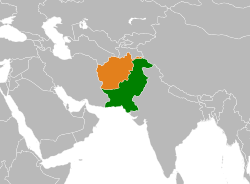History
Cricket in Afghanistan was popularised by Afghan expatriates who learnt the sport while living in Pakistan in the 1980s and 1990s, during the post-Soviet invasion era. [1] [2] Most members of the early Afghanistan national cricket team grew up in northwest Pakistan and participated in the country's domestic cricket structure, making use of cricket facilities in Peshawar with the support of the Pakistan Cricket Board (PCB). [12] [2] It was during this time that the Afghanistan Cricket Federation (now ACB) was also founded, in 1995. [13] The ACF received recognition from the International Cricket Council (ICC) in 2001. [13]
Several future cricketers representing Afghanistan emerged from Peshawar's club cricket scene, establishing an Afghan cricket club to compete against other local Pakistani sides in the 1990s. [13] Afghanistan fielded their cricket team in Pakistan's domestic setup for the first time in the 2001–02 season, participating in the second division of the Quaid-e-Azam Trophy where they drew two and lost three of their five games. [14] [15] They returned for the Cornelius Trophy in the 2002–03 season, drawing one and losing three matches. [16] In the 2003–04 season, they made an appearance in the PCB's inter-district tournament in Peshawar, where they registered their lone victory against Swabi, drew twice and lost two matches. [15] [17]
The Afghanistan national team was coached by former Pakistani cricketers Kabir Khan and Rashid Latif in its initial years. [1] [12] During this period, a number of Afghan international cricketers made appearances for Pakistani domestic outfits in the first-class circuit. [2] [18] [19] In 2010, Afghanistan competed at the Asian Games, a non-ICC T20 event hosted by China, where they defeated a second-string Pakistan side by 22 runs in the semi-finals in what was considered an upset. [20] In May 2011, the Afghan side embarked on a tour of Pakistan to partake in a three-match limited overs series against Pakistan A, where they were whitewashed by the home side 3–0. [21] [18] They followed this up with another tour in September to participate in Pakistan's domestic National T20 Cup in Karachi as the Afghan Cheetahs, but had another poor outing, losing all three of their matches. [22]
On 10 February 2012, Afghanistan played a one-off One Day International (ODI) match against Pakistan at Sharjah, the first ever official game between the two sides and also the first ever ODI between an Affiliate and a Test-playing nation. [23] Billed as a historic occasion for Afghan cricket, the game was won comfortably by Pakistan by seven wickets with 13 overs to spare. [24] [25]
In February 2013, Afghanistan visited Pakistan to play a series of limited-overs matches against the Pakistan A team and some regional sides. They played five one-dayers and a Twenty20 at three venues around the country. They won their first limited overs game against Hyderabad–Karachi by nine wickets, [26] but lost their matches against Bahawalpur–Multan and Faisalabad–Rawalpindi. In their matches against Pakistan A, they were clean sweeped by the Pakistani side 2–0 in the one day series and 1–0 in the T20 series. [27] In March, the PCB and ACB inked a two-year memorandum of understanding allowing Afghanistan to use Pakistan's cricket facilities such as the National Cricket Academy and seek technical assistance for the purpose of further developing Afghan cricket. [18] Later in December that year, Pakistan and Afghanistan faced each other in a one-off T20I in Sharjah, where Pakistan prevailed with a six wicket victory with a ball to spare. [28] Since then, the two sides have clashed in the ODI and T20I formats on multiple occasions. In World Cup 2023 Afghanistan beat Pakistan in a match played on October 23, 2023. Ibrahim Zadran, who was awarded player of the match award, dedicated the win to “people who are sent from Pakistan back home to Afghanistan”. His statement was considered controversial especially from Pakistan side amid the decision from Pakistan to deport all illegal Afghan citizens. [29]
